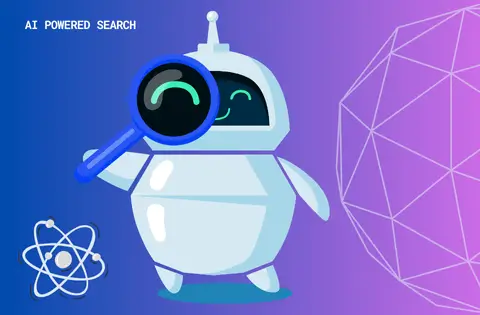The Future of AI-Powered Search: Key Trends & Directions

The future of AI-powered search is evolving rapidly and holds exciting possibilities. Traditional search engines like Google and Bing have largely focused on keyword-based matching, indexing, and ranking of web pages. However, as AI technologies, especially those related to natural language processing (NLP), machine learning, and deep learning, advance, AI-powered search will become increasingly sophisticated, personalized, and interactive.
It covers trends in personalization, conversational search, voice and multimodal user inputs, and ethical concerns.
Key Trends & Directions for the Future of AI-Powered Search
1. Semantic Search & Understanding Context
Traditional search engines often rely on keyword-based queries, but AI will increasingly enable semantic search, which focuses on understanding the meaning behind a search query, rather than just matching keywords. AI can interpret context, disambiguate phrases, and return results that align better with user intent.
For example, if you search for “best ways to lose weight,” AI might understand the context around health goals, personal preferences, or medical conditions to surface more relevant results, whether it’s about diet plans, exercise routines, or lifestyle changes.
2. Conversational Search & Chatbots
With advancements in natural language processing (NLP) (like GPT models, including ChatGPT), AI search will become more conversational. Instead of just typing a query and receiving a list of links, you might have an interactive, back-and-forth dialogue with the AI.
For instance, if you ask about “the best laptops for gaming,” the AI could engage in a conversation, asking you follow-up questions about budget, preferred brands, or specifications to provide you with a tailored list.
Search engines will evolve to handle complex, multi-step queries more effectively, even enabling users to refine and clarify their requests over time.
3. Personalized Search Results
AI will leverage vast amounts of personal data to deliver hyper-personalized search results. By analyzing your browsing history, preferences, location, and even your previous search patterns, AI can provide results that are specifically suited to your unique needs.
For example, if you’re consistently searching for plant-based recipes, your future searches might prioritize vegetarian or vegan options. Alternatively, AI could use insights from your social media or health apps to offer more customized advice.
4. Voice and Multimodal Search
As voice assistants (like Siri, Alexa, and Google Assistant) become more sophisticated, voice search will continue to grow in importance. Combined with advancements in multimodal search, AI will integrate multiple types of input (text, voice, images, video) to return more comprehensive results.
Imagine asking a voice assistant to find a nearby restaurant, and it not only provides restaurant names but also analyzes your preferences based on past visits, current weather, and other contextual factors.
Additionally, with image and video search capabilities improving, users might be able to search using images (e.g., finding similar products or identifying plants in a photo), and AI will provide results accordingly.
5. AI-Generated Content & Answering Queries Directly
AI has the potential to generate direct answers for users, reducing the need to click through multiple web pages. This trend is already visible with Google’s Featured Snippets or Knowledge Panels, but in the future, AI could provide deeper, more nuanced answers based on information pulled from across the internet and other sources.
For instance, rather than simply showing a list of websites when you search for “how to improve productivity,” the AI might generate a detailed guide or answer directly, drawing from various credible sources.
6. Integration with Other AI Technologies
AI-powered search will also integrate seamlessly with other AI technologies to enhance user experience. For example, AI could be used in the background to improve results by drawing insights from predictive algorithms, deep learning models, and even emotional analysis to understand user sentiment and preferences.
AI might integrate with augmented reality (AR) or virtual reality (VR) technologies to make search results more immersive. Imagine trying on clothes virtually before buying them, or visualizing complex data in 3D while you search.
7. AI in Local and Hyperlocal Search
AI will also improve local and hyperlocal search by analyzing various data sources like real-time traffic, nearby businesses, or local reviews. Search results could be tailored to your precise location, and predictive AI could offer relevant suggestions before you even search—anticipating your needs based on patterns and context.
For example, if you’re at a conference and search for lunch options, the AI might suggest places nearby that offer your preferred cuisine and have available tables, factoring in user ratings, wait times, and even your dietary preferences.
8. Ethics, Privacy, and Bias Concerns
As AI-powered search becomes more integrated with personal data, ethics, privacy, and bias will become significant concerns. Search algorithms could inadvertently reinforce biases, and the collection of personal data raises privacy issues. The future of AI-powered search will likely include more robust mechanisms for ensuring transparency, fairness, and user control over data privacy.
Companies might have to comply with stricter regulations (like GDPR in the EU) and implement technologies that allow users to see and manage how their data is being used.
9. Search Beyond the Web: Integration with Offline Data
AI might increasingly extend search capabilities beyond just the web to include offline data sources. This could involve searching for things like product availability in local stores, inventory in warehouses, or information within enterprise systems. As AI becomes more connected with various data silos, it can provide a more holistic view.
10. Augmented Intelligence (AI as an Assistant)
Rather than replacing human decision-making, AI will enhance human intelligence. In the future, AI-powered search may provide real-time recommendations and insights, acting as an augmented intelligence tool. For example, when researching for a project or report, AI could offer suggestions, organize findings, and even help you structure a draft—making the search process more like a collaboration than just an information retrieval task.
Conclusion
The future of AI-powered search is characterized by a deepening of intelligence, interactivity, and personalization. AI will evolve from being a tool for querying information to becoming a highly integrated, conversational, and intuitive assistant that understands, anticipates, and adapts to the unique needs of users. However, to truly realize this future, there will need to be careful management of ethical, privacy, and bias concerns.
